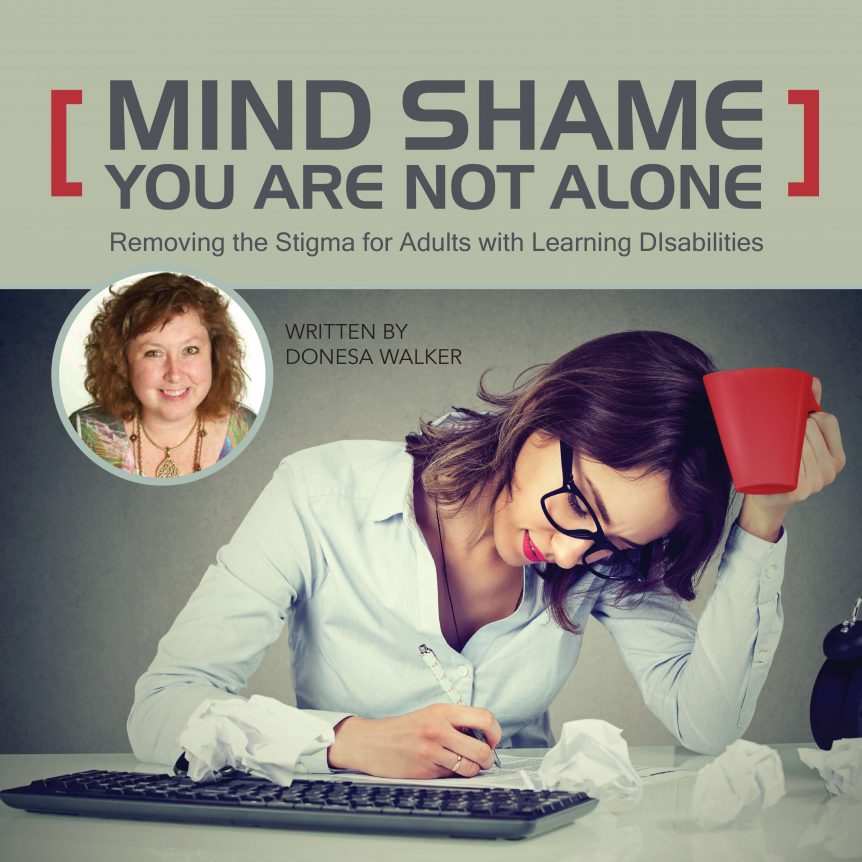Removing the Stigma for Adults with Learning Disabilities
The noise is driving me crazy and I cannot function!
I’ve struggled with this for years and still do but don’t want this for my child.
My boss just doesn’t understand that I cannot process all of that at one time so I need a new job.
I simply cannot pass the test to advance and need help.
My attention has gotten so much worse and my memory stinks.
These are only a few of the things I hear from adults on a daily basis and surprisingly few of them are in my office. Actually, most are out in the public domain where people are feeling the shame of struggling but do not know how to address it. Let’s shed some light on learning differences and move away from the clouds of mind shame.
What is mind shame?
Mind shame is a term, coined by the specialists at Children of the Code, where they have some amazing videos explaining the term for children/adults who struggle with dyslexia and understanding the code to reading. Essentially, the term simply means an extreme embarrassment at the inability to perform in the same manner as others around us. While that makes the term easy to understand, it is quite the deal to wrap your thoughts around the actual meaning behind this. Mind shame causes many expressions of emotion and turmoil not limited to anxiety and depression, attentional issues and guilt.
How do we address this culturally and societally?
Openness. Acceptance that not all people think the same and learn the same way and this is okay. The solution is getting help to make us feel whole. There is nothing wrong with a learning difference, but it can make it hard to function even if everyone around you is accepting of the difference. Why? Because most of us don’t want to be different or to be perceived that way.
What help is available to adults struggling with learning issues?
Do you know what’s causing it? Identify the why behind the learning issue. This can be done through testing at a local psychologist if you want a formal diagnosis or if you are just wanting to identify the skills that are causing this struggle, you can come see us at LearningRx for a cognitive test. You can also call in or take one in the privacy of your home via computer. There is no reason for you to struggle silently wondering what is wrong.
Once you know what the root cause is and are comfortable with addressing it by getting brain training in-person or digitally, then you may also need to see a counselor for the grief, shame, guilt, anxiety or worries that the situation is causing or has caused you.
“Cindy” loved her job but felt very overwhelmed. She could not function with all of the distractions and auditory overload that was causing her to lose focus and be unable to feel success at her job. The situation was getting worse and worse. Finally, she decided after talking to a friend whose child had gone to LearningRx to call and see if they helped adults too. After testing, Cindy realized that her auditory input was being overloaded and she was completely losing focus due to the amount of auditory data that her brain was trying to process when it wasn’t working at peak efficiency. After enrolling in a program with a personal brain trainer, Cindy began to understand her own brain and how to tune it efficiently when the auditory load became too much. She understands what exercises reduce her frustration and allow her brain to function at peak capacity. Yes, this is a blatant testimonial but the point is that instead of allowing the SHAME of not being able to cope to overwhelm her and cause her to leave the job that she loved, she was able to embrace that there was an issue and it could be addressed.
“Brad” struggled with managing his day-to-day schedule. He was constantly behind and although he owned his own business, his lack of management was impacting his home life and causing conflict in his family. He wanted to be able to achieve more balance and be able to do all the things he needed to do efficiently but his brain just didn’t work like that. He went to a counselor who was helping him with the anxiety but the juggling of the jobs and home life was just overwhelming him. His counselor recommended that he get testing to identify what was causing the underlying issues. Brad got tested at a local psychologist’s office and discovered that he had an executive functioning issue that was not allowing his brain to do the CEO duties efficiently. Brad chose to partner with his counselor to address this. He discovered that by taking some planning time in the mornings before he took off on his jobs, he could balance things better and complete jobs in a timelier manner. This allowed more home time with his family and alleviated the struggle. Again, this is an example of someone who took charge and decided for themselves that it was time to end the struggle.
“Cheryl” struggled with memory. She was known as the sticky note queen in the office because she had them everywhere to remind her of what was next. She had alarms on her phone and other reminders as well. But these things were beginning to get on the nerves of others around her and her boss complained that she was a disorganized mess. She tried to explain that it was just her way of managing but he insisted that she do “something about it.” Cheryl decided to partner with a friend and work out a better manner for her organizational strategies. She consulted a professional who shared with her that she had ADD. Cheryl began to take medication for her ADD and with her friend’s assistance, she was able to become the responsible person her boss deemed worthy enough to be promoted.
“Dallas” is a college student who struggles with math. She absolutely hates math and has had tutors for math her whole life. College math is a nightmare and makes her feel stupid. She is constantly putting herself down and has a mental block when it comes to anything related to math including her checkbook. Dallas is undiagnosed and makes it through the class with the help of the tutors but continues into adulthood avoiding math like the plague. When she has her first child, she is terrified of misdoing medication dosages and as the little boy grows up, she determines that somehow, he will get the help he needs with math so he doesn’t struggle as she does. The crazy thing is, she is successful. She has multiple degrees and has been a successful teacher for many years. One day as she is doing research for her job, a parent introduces her to a new thought, brain training. And she embarks on the journey to finding this hope. If this story sounds familiar then, yes you guessed it. This is my story. I found LearningRx and it helped me discover math was not a disease after all. Learning math could be fun. Both of my boys did LearningRx and are successful in their lives and careers (that includes math). No, I am not an accountant…but I am no longer afraid of math nor do I feel insignificant and less than when it comes to math. Why? Because I took charge and did brain training for myself.
The point here isn’t a LearningRx commercial but rather to share that taking charge of your own strengths and weaknesses is possible and knowing is all a part of that. Mind shame isn’t something you should continue to deal with, but rather simply a limiting factor to what your potential can be.
No one should feel less than. No one should feel like they can’t do whatever they put their mind towards doing. Embrace that there is hope. Reach out to others around you. Ask for help. There are community resources that can help you. Erase the shame and embrace your brain.








